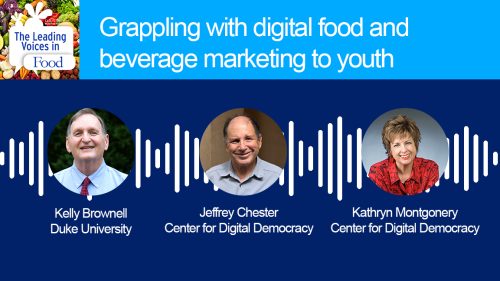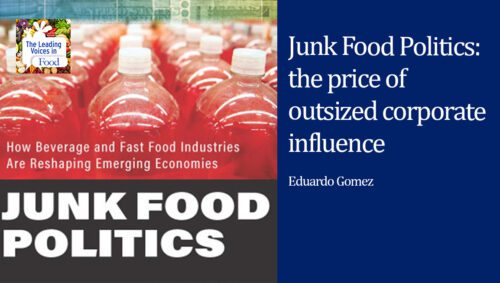The Leading Voices in Food
E35: Jennifer Pomeranz on Food Policy and Industry Tactics Driving Preemption
In the past several years, cities in California led the way in passing taxes on sugar-sweetened beverages. Berkeley was first with Oakland, San Francisco and Albany, California following, each with the aim of improving public health by decreasing consumption of beverages known to be associated with obesity, diabetes, and other medical issues, and to raise revenue for needed programs. But then something historic happened: preemption. A leading expert on the application of the law on public health and on the issue of preemption is Jennifer Pomeranz.
Subscribe: Apple Podcasts | TuneIN | YouTube Music | SoundCloud | PocketCasts | Radio Public
Tags: Advocacy & Food | Food Industry Behavior & Marketing | Food Policy | Obesity | Soda Taxes |

Jennifer Pomeranz is an attorney and an assistant professor in the College of Global Public Health at New York University. Her research focuses on public health, law, and policy. She holds a law degree from Cornell University and a master’s in public health from Harvard. She’s especially interested in policy and legal options to address diet-related disease.
Interview Summary
What is preemption?
Preemption is when a higher level of government withdraws or limits the authority of a lower level of government to act. And so let me give you a little context and differentiate between two different types of preemption. One is what we normally call preemption is ‘ceiling preemption.’ And this is when the higher-level of government creates a maximum standard that no local government or state government can go beyond. An example of this is federal regulations for packaged food labels. For the most part, the federal government preempts any type of state or local food label that would be different from federal regulation. Another type of preemption is what we call ‘floor preemption.’ And this is minimum standards. An example of this is the Civil Rights Act, where the federal government allows states and local governments to go further to protect additional individuals not named in the federal law. But the problem we’re seeing is that states actually are enacting a wide range of preemptive laws using ceiling preemption and just wiping out the ability of local governments to act, while not establishing statewide standards.
So what exactly happened in California with the taxes?
So in California, several local governments have sugary-beverage taxes, and other local governments were also considering them. And then on Monday, June 25th, 2018, the California State Legislators amended a budget bill to preempt all new local soda taxes from being passed by any local government. What’s so fascinating about this is that this budget bill had been originally proposed in January, so it had been in the works for about six months. Then all of a sudden on a Monday, this preemptive amendment was proposed. It flew through the State Legislators and already on a Thursday that Thursday, June 28th the governor signed it. So it was reported that deals were taking place behind closed doors during the weekend prior to this week.
Subsequently, I’ve seen some press reports about money from the sugary beverage industry spent on things related to travel for the governor and the like, have you heard about that?
Oh yes. And there was a funny picture released by the Sacramento Bee showing the governor with beverage industry executives looking quite shocked if you get to see that picture. So, yes. And so it’s concerning. The beverage industries were certainly involved in this situation.
So the Governor at the time, Jerry Brown I would have thought would have been generally in favor of such things like sugar beverage taxes. But it sounded like he just got involved in horse trading, that there was something else that he wanted more. And so he gave in on this in order to accomplish some other goal. Is that correct?
Yeah, so really the California Legislators and the Governor were strong-armed by the beverage companies. What happened was the beverage industry threatened to add a California ballot initiative on the ballot in November that would have made it very difficult for local governments to raise any types of taxes. So this is a huge threat for local governments ability to fund police and fire transit and other public services. So the California State Legislatures really felt that they could not risk such a loss of control for local government. So they felt they had to make this deal. And the beverage industry agreed to withdraw this ballot initiative in exchange for state preemption. And that’s what happened really.
So do you think the public is generally aware of the behavior of the beverage industry or do you think this is largely hidden?
Unfortunately, I don’t. I do not think the public is aware because another great example of a similar situation was that a ballot initiative did pass in Washington State during that November 2018 election. And the beverage industry spent over $20 million on a campaign talking about affordable groceries and having nothing to do with sugary beverages. But the whole goal of this ballot initiative and the campaign was really to ensure that no sugary-beverage taxes could be passed in the state. And there’s some great investigative reporting, including by the New York Times, that found that when you actually spoke to people, they had no idea that the beverage industry was behind this tactic. And, that it was a ballot initiative being supported by the beverage industry to shield it from sugary-beverage taxes.
So you mentioned preemption occurring in California. And by the way, it’s true isn’t it, that the existing taxes can remain in place, but it was just new taxes that the bill addresses that, correct?
Yes. Correct.
Okay. So you mentioned California and the state of Washington. Are there other states where this preemption it becomes an issue?
Yeah, so we’re seeing it in terms of taxes and Michigan and Arizona were the first, at the end of 2017 and the beginning of 2018 respectively. They both passed laws that preempted any new food and beverage taxes in the state. Then California and then Washington, as the ballot initiative. Interestingly, Oregon had a ballot initiative to do the same thing, but in that case, the beverage companies spent much less, and there was a large opposition in Oregon that was established that was just not able to be matched in Washington. So in Oregon, that ballot initiative was not passed.
So is preemption unique to a sugary-beverage taxes or are states considering this in the context of other food and nutrition issues?
So, unfortunately, 15 states have preempted food policies, and they’re preempting a wide range of topics from everything from experimental policies–maybe we would consider toy ordinances or portion caps at this point, you know, new and innovative–but to more established and evidence-based policies like sugary-beverage taxes and nutrition labeling. And so 15 states have preempted a wide range of policies, and there’s also some concern about some of the preemptive language. A really good example is that we’re seeing on defined terms such as food-based health disparities. This is preempted in Kansas and Mississippi. But this is concerning for a couple of reasons. First, we know disparity’s stem from our food system. Like, for example, unequal access to fruits and vegetables. So we would want our local governments to be able to address this, but they’re preempted in those two states. And then second, because the term is not defined and it’s kind of vague, local governments will not be really clear on what exactly is preempted. So they’ll be what’s called chilled in legal language from enacting policies. They’ll be worried about enacting a wider range of policies than might have actually been preempted just to avoid being sued. So we’re seeing these kinds of concerning tactics, along with several different types of policies being preempted.
So what do you think can be done to preempt these efforts at preemption?
A lot of it I think has to involve grassroots movement building, educating the public, really getting the media involved and educating the media on what’s really going on here. The get out the vote is also important in terms of preemption. Voting in elected officials that actually care about public health and food issues is just as vitally important. And, all the advocacy and grassroots movement and all the activity that is happening around food policy in America, which there is a ton, it has also to be dedicated specifically to preemption. So that preemption is part and parcel of all advocacy plans and policies because we are just seeing such an enormous upswing of preemption, especially in the food area with no state laws to establish statewide standards. So we’re just seeing now huge gaps in regulation and voids in control over areas that would have benefited the citizens in those states. So I would argue that preemption needs to be just as important to the substantive food up policy efforts that everyone is working on.












